Journalist and documentary filmmaker Denise Silveira was one of the speakers at Velo-City 2019, which took place in July in Dublin, Ireland. In addition to talking about her movie Ciclovia Musical (Musical Bikelane), she took the opportunity to record the event in interviews and small photos taken with her smartphone.
This first text shows the overview of Dublin and Velo-City, and tells the story of Carlos Oliveira, a Brazilian activist from the organization Pedala Queimados, who was also there in Ireland
It is summer in Dublin and the temperature varies between 13 and 21 degrees Celsius. On the long avenue cut by the River Liffey, the traffic light opens to a water truck and closes for pedestrians and cyclists. The scene may seem ordinary, but here the truck doesn't take water. It takes Guiness in the gallon tank, the black Irish symbol beer, which also name the Guinness Book of Records.
.
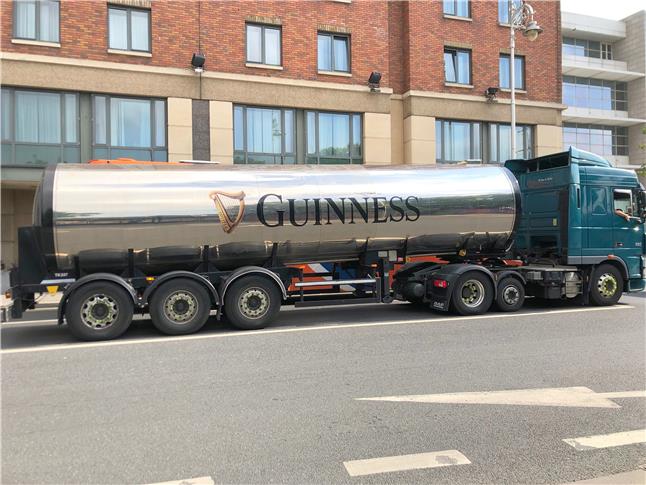 A truck of Guinnes, the famous Ireland beer Foto: Denise Silveira
A truck of Guinnes, the famous Ireland beer Foto: Denise Silveira
The architecture of the Convention Center catches the view. A glass cone comes to life out of a block of concrete that forms the building. In this glazed over part are the escalators to access the auditorium and different rooms. Kevin Roche, project author and Pritzker Prize winner, the "Nobel" of architecture, passed away in March this year, makes us feel inside the river. A sensory experience that gets even more strength when mixed with the different languages that can be heard in the hallways.
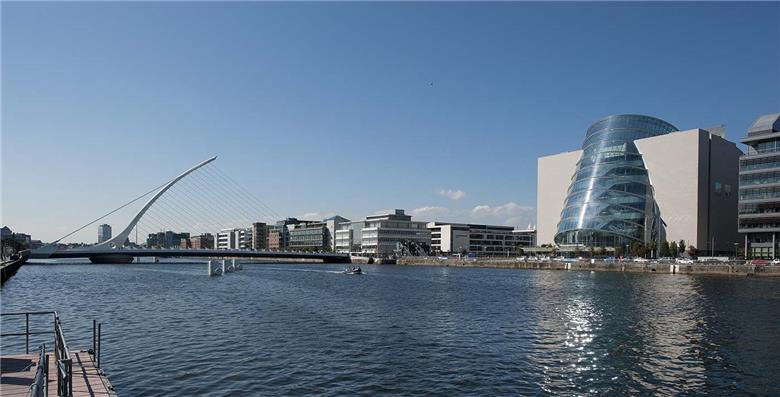 The Dublin Concvention Center: designed by the architect Kevin Roche Foto: Divulgação
The Dublin Concvention Center: designed by the architect Kevin Roche Foto: Divulgação
Three hundred speakers took the stage in over 80 sessions, to an audience of more than 1.400 bicycle lovers. Advocates, consultants, technical experts, civil servants, politicians, academics, and industry professionals from several developed and developing countries.
Velo-City is the largest conference in the cycling world, cycling infrastructure, bicycle innovations, bicycle safety, social and cultural changes. No matter your area, if it is about biking for sure you will find it here. An exceptional work of the European Cyclists Federation held every year in a different city. Last year was in Rio de Janeiro, Brazil. Next year will be in Ljubljana, the capital of Slovenia. In 2021, Lisbon, Portugal.
Who could imagine that 39 years after the first edition in Bremen, Germany, one of the innovations would be the app developed especially for the event. By the app it was possible to follow the schedule, receive alerts, answer and ask questions during the panels. As well as access to audio tour guides around the city, alternative routes for bicycle and also wheelchair. Technology retired business card. By scanning the badge QR code in your smartphone camera you could get one more contact to your phone book properly saved in alphabetical order.
The city of the future is here. At least at the opening ceremony. One keynote speaker could not sleep the night before. He is Phillippe Crist, Advisor, Innovation and Foresight International Transport Forum at the OECD, Organization for Economic Cooperation and Development, based in France. French-American dual national, ex-competitive cyclist, and now he bikes the hope of the future. In a pleasant post on a social media affectionately talks about speaking of a such special subject to an audience of 1.400 converted who believes the future will come by bicycle: "When I stopped speaking, my mind was empty. A complete blank. But my heart was full. Like I hope the audience's was".
Crist shared his experience of google "city of the future". If you were not there, you can stop reading and try to do the same. Please, click on images. Take a look and then return to this article.The result of your search is exactly the same as Crist's. Futuristic cities, flying cars, intelligent buildings.
"When we discuss our vision of city of the future, it says more about where we are coming from, where we are now, than where we will be on the future", says Crist.
Reminds "Blade Runner," science fiction of the 80's. But if the movie about the future directed by Ridley Scott goes far away from digital inclusion, imagine for those born in Queimados, at Baixada Fluminense, Brazil.
This is the story about Carlos Oliveira, one of the panelists in the session Engagement - Resistance and Inspiration towards the Cycling City of 2030. A reference to 2030 Agenda for Sustainable Development, UN, United Nations.
In just a few minutes, the environmental manager submit his work to draw the audience's attention to his desk. A format also known as "pitch", much used by startups to attract investors.
Even without speaking a word in English, he made himself understood. He was assisted by Ana Carboni, who acted as a translator. Carboni is an Union of Cyclists of Brazil's consultant and also part of Brazilian abstracts selected for the conference. After overcoming language barrier, Carlos surprises every sentence.
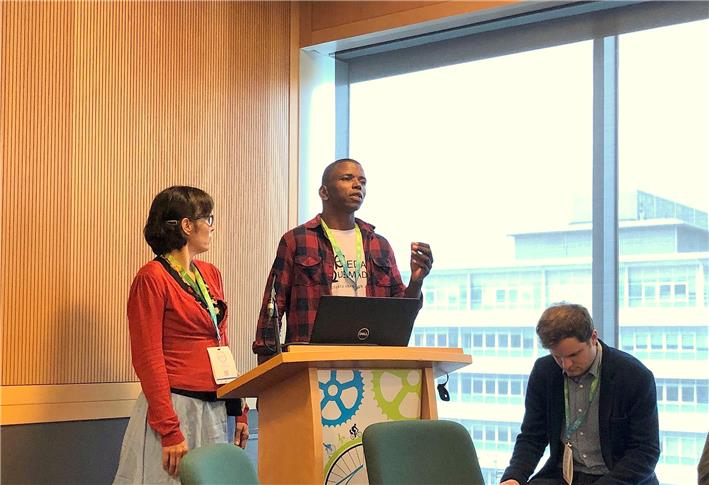 Pitch: Carlos Oliveira speaks about Pedala Queimados Foto: Denise Silveira
Pitch: Carlos Oliveira speaks about Pedala Queimados Foto: Denise Silveira
Nowadays receives financial support from a socio-environmental fund. He looks for second-hand bike donations, makes repairs, and delivers to about 10.000 low-income residents. In addition to receiving no government aid, he still had to deal with problems of a disputed area between drug dealers and militias. Carlos joins two sides: macroeconomic and micromobility. He helps people who are part of a national statistic of more than 13 million unemployed to get a small income as bike deliverers for local stores. There is no bicycle for everyone, so bikes are shared and the residents learn self-management.
For this work, Carlos received a cash award last year from the Dutch Cycling Embassy, 1.500 euros.
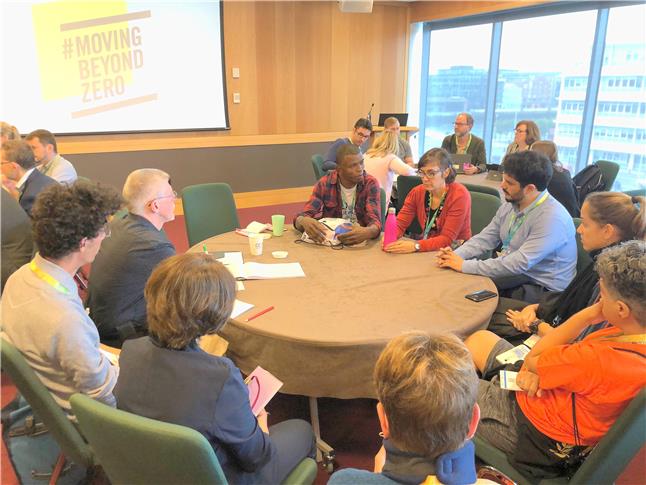 Cédric Delbovier, from Pro Velo (Belgium), during a round table with the Brazilian Carlos Oliveira Foto: Denise Silveira
Cédric Delbovier, from Pro Velo (Belgium), during a round table with the Brazilian Carlos Oliveira Foto: Denise Silveira
Carlos latest activity took the attention of Cédric Delbovier, a 13-year-old Pro Velo employee, a non-profit association in Belgium. Pro Velo's goal is to improve active mobility and to make it easy the transition to cycling. Delbovier works on communication and he is part of an education team to teach children from 8 to 12 years old to pedal safely in the traffic of Liège, Wallonia, the French-speaking part of Belgium. Even with the natural obstacles that separate drivers and cyclists anywhere on the planet, the future of Liège is built in the present. In Queimados, Carlos struggles to build the first pillars of this bridge in a socially unprotected region. "Who is going to take care of my son when he's 15"?
The question that echoes in Carlos mind has resulted in a new battle. He begins to empowering prison system former inmates by training them to craft bamboo bikes so they can get an income and do not recidivate into crime relapse.
"We have to give back the streets to people. It's not necessary technology for that", Carlos says.
Delbovier had never heard about Carlos before but they have common goals. In Belgium, Pro Velo takes traffic offenders and instead of paying a ticket, they accompany educators in the schools and supervise bike rides on the street. This makes them aware of the consequences of unsuitable speed, for example, in a city or a village.
"Pedala Queimados project is a beautiful project. It helps people forgotten and not respected by the authorities", Delbovier says. At Velo-city the distance separating Liège from Queimados is the circumference of a table.
About Carlos Oliveira, director of Pedala Queimados
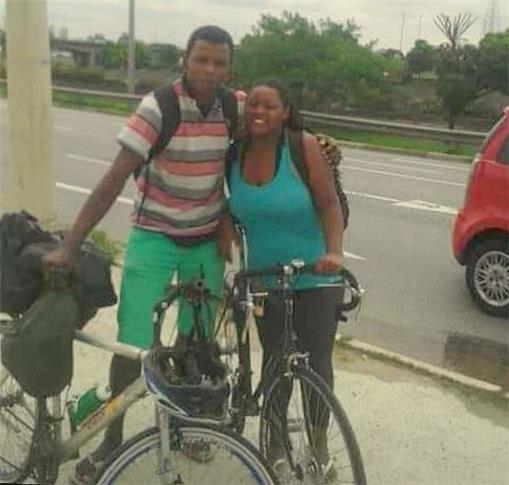 Carlos Oliveira and his wife Ana Cristina during the trip Rio-São Paulo Foto: Arquivo pessoal
Carlos Oliveira and his wife Ana Cristina during the trip Rio-São Paulo Foto: Arquivo pessoal
Carlos city of the future is on a trigger of a gun. Queimados is one of the most violent deaths counties in Brazil, according to the Atlas of Violence, by Institute of Applied Economic Research (IPEA) and Brazilian Forum of Public Security (FBSP). Not even the lack of better financial conditions made Carlos stop pursuing a better future. In 2015, with only R$ 1.40, equivalent of EUR 0,33, in his pocket and two boxes of candies to sell on the way, he cycled about 400 km with his wife, Ana Cristina, to São Paulo. The goal was to arrive in time for his brother's 40th birthday.
Ana Cristina remembers when she got in this four days adventure. The couple cycled from 5:00 am until 6:00 pm and slept in gas stations. He was very worried that something could happen to me on the road. But he did not say that to me. Only when we got there. Carlos traveled to Dublin by the support of private initiative and civil society organization. With the money he received to be a week overseas, he made supermarket shopping for his pregnant wife and a three-year-old son. Instead of a hotel, he was in a hostel with rooms and shared bathrooms. When the daily rate increased by the weekend arrival, he checked out and went down the street. He spent the night cycling around Dublin, as he could get some sleep on the plane the next day.
If anyone thinks he would go back to Brazil that is not the right answer. Even with no money, for the first time in Europe, Carlos still went to Amsterdam and other cities in the Netherlands, a paradise for cyclists. He slept in acquaintances home and made technical visits to entities that support Pedala Queimados. On his way home, after landing at Tom Jobim International Airport, known as Galeão, he took a regular bus.The country received him back with a gunfight on Brazil Avenue. Fortunately for Carlos and all who dream a future for Queimados, he was not hit. Arrived just in time to celebrate another win. A partnership with Movimento La Frida, from Salvador and Recôncavo, presented at Velo-city by Livia Suarez, and Preta, vem de Bike, São Paulo. A joint project for exchanging experiences was selected by a financing social and environmental foundation.
______________________
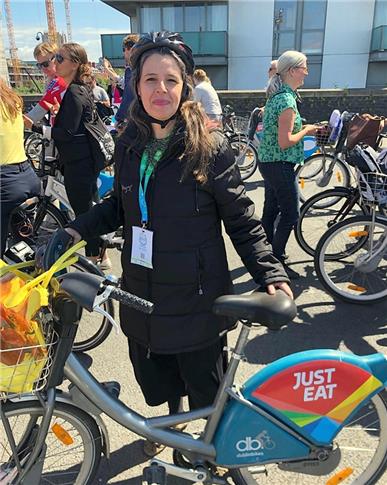
*Denise Silveira, 50, journalist and documentary filmmaker. Took part at Velo-city as a speaker at the "Media, Friend or Foe" panel. Honorable Mention at Mobifilm 2018, Brazilian Film Festival on Mobility and Traffic Safety, with the documentary "Ciclovia Musical".
Read too (in Portuguese):
Como foi o Velo-City, no Rio de Janeiro
Projeto Bike Sem Barreiras possibilita pessoas com mobilidade reduzida
Sete mitos sobre ciclovias (e qual é a verdade)
A Economia da Bicicleta no Brasil
Leia este texto em Português:
Pequenas histórias do Velo-City 2019